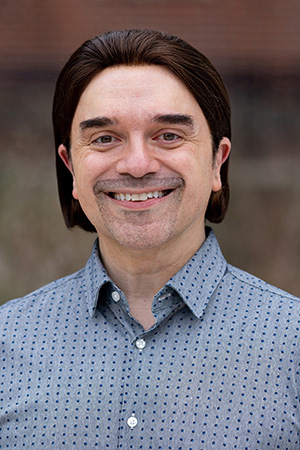
Steven Torres
- Professor
- 402.554.3749
Additional Information
Research Interests
- Cultural studies
- Cultural politics
- Metacultural discourse,
- Spanish literature and film
- Environmental humanities
- Spanish Civil War
- Cultural and political activism
Education
Ph.D., Spanish Literature, University of Nebraska-LincolnM.A. Hispanic Literature, University of Nebraska-Lincoln
Recent Publications
“For a Cultural Politics of Engagement: Combating Information Poverty in and out of Class.” Co-authored with Palmar Álvarez-Blanco. Language, Image, Power: Luso-Hispanic Cultural Studies Theory and Practice. Routledge, 2021. Forthcoming.
“Acerca del pensamiento propositivo y ecointegrador: Referencias y referentes.” Co-authored with Palmar Álvarez-Blanco. Arizona Journal of Hispanic Cultural Studies 23 (2019), 235-242.
“After the 15M.” Introduction co-authored with Óscar Pereira-Zazo. Spain After the Indignados/15M Movement: The 99% Speaks Out. Eds. Óscar Pereira-Zazo and Steven L. Torres. Palgrave-Macmillan, 2019. 1-17.
“Toward a New Cultural Politics for Spain.” Concluding chapter co-authored with Óscar Pereira-Zazo. Spain After the Indignados/15M Movement: The 99% Speaks Out. Eds. Óscar Pereira-Zazo and Steven L. Torres. Palgrave-Macmillan, 2019. 321-330.
“Activismo y militancia estadounidenses en las obras de Carlos Blanco Aguinaga y Luis Martín-Cabrera.” Studi Ispanici, 2019: 307-321.
“Transformative and emancipatory research and education: A counter-practice in research and teaching.” Co-authored with Palmar Álvarez-Blanco. Review of Education, Pedagogy, and Cultural Studies, 40.4 (2018): 305-328.
Community Engagement
Many of my upper-level courses include a Service Learning component that is central to the course. For instance, since 2014, students in my advanced classes have participated in voter canvassing and voter registration in conjunction with the Heartland Workers Center in South Omaha, a project that allows students to promote civic participation while interacting with Spanish speakers from different backgrounds.
Other students have participated in collaborative translation projects, including a variety of interviews published by the Constellation of the Commons. Other advanced students have conducted surveys of the population in South Omaha in order to help local artists make informed choices when they embark on a public art project. Likewise, Advanced Conversation students have served as interpreters for the SHARING Clinic at UNMC and for the Bi-National Health Week.
Additional Information
Research Interests
- Cultural studies
- Cultural politics
- Metacultural discourse,
- Spanish literature and film
- Environmental humanities
- Spanish Civil War
- Cultural and political activism
Education
Ph.D., Spanish Literature, University of Nebraska-LincolnM.A. Hispanic Literature, University of Nebraska-Lincoln
Recent Publications
“For a Cultural Politics of Engagement: Combating Information Poverty in and out of Class.” Co-authored with Palmar Álvarez-Blanco. Language, Image, Power: Luso-Hispanic Cultural Studies Theory and Practice. Routledge, 2021. Forthcoming.
“Acerca del pensamiento propositivo y ecointegrador: Referencias y referentes.” Co-authored with Palmar Álvarez-Blanco. Arizona Journal of Hispanic Cultural Studies 23 (2019), 235-242.
“After the 15M.” Introduction co-authored with Óscar Pereira-Zazo. Spain After the Indignados/15M Movement: The 99% Speaks Out. Eds. Óscar Pereira-Zazo and Steven L. Torres. Palgrave-Macmillan, 2019. 1-17.
“Toward a New Cultural Politics for Spain.” Concluding chapter co-authored with Óscar Pereira-Zazo. Spain After the Indignados/15M Movement: The 99% Speaks Out. Eds. Óscar Pereira-Zazo and Steven L. Torres. Palgrave-Macmillan, 2019. 321-330.
“Activismo y militancia estadounidenses en las obras de Carlos Blanco Aguinaga y Luis Martín-Cabrera.” Studi Ispanici, 2019: 307-321.
“Transformative and emancipatory research and education: A counter-practice in research and teaching.” Co-authored with Palmar Álvarez-Blanco. Review of Education, Pedagogy, and Cultural Studies, 40.4 (2018): 305-328.
Community Engagement
Many of my upper-level courses include a Service Learning component that is central to the course. For instance, since 2014, students in my advanced classes have participated in voter canvassing and voter registration in conjunction with the Heartland Workers Center in South Omaha, a project that allows students to promote civic participation while interacting with Spanish speakers from different backgrounds.
Other students have participated in collaborative translation projects, including a variety of interviews published by the Constellation of the Commons. Other advanced students have conducted surveys of the population in South Omaha in order to help local artists make informed choices when they embark on a public art project. Likewise, Advanced Conversation students have served as interpreters for the SHARING Clinic at UNMC and for the Bi-National Health Week.